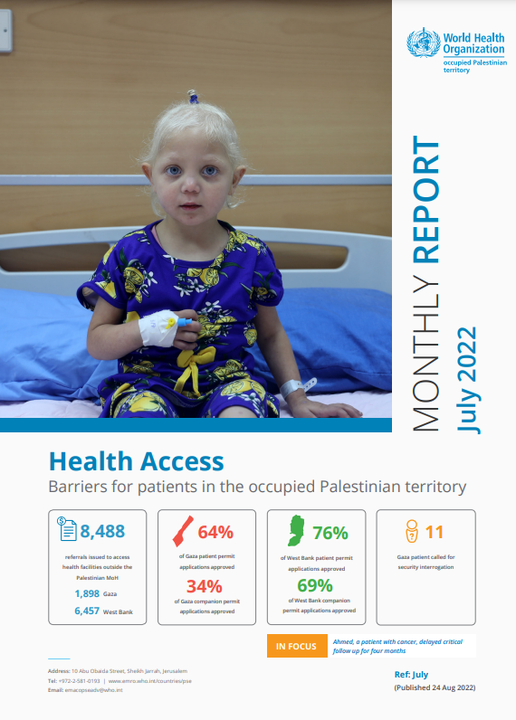The WHO revealed in its latest Health Access Report published on the 24th of August 2022 and shared on the organization’s official social media sites on Friday August 26th, 2022, that just in July Israeli occupation authority did not approve permits for 1922 patients in time to reach appointments
371 patients from Gaza traveled without companions in what is considered the highest rate since April 2020 as 11 Gaza patients were called for security interrogation.
In July, the Palestinian Ministry of Health (MoH) issued 8,488 referrals to health care services delivered by non-MoH providers, 2% higher than the monthly average (8,308) for 2021. Referrals from the West Bank comprised 76% (6,457) of the total, including 1,034 referrals for patients from East Jerusalem, while referrals for the Gaza Strip accounted for 22% (1,898) of the total.
Four referrals were issued for Palestinian patients present in Jordan, while the origin of 129 referrals (2%) was not reported. Palestinian MoH referrals to hospitals in the West Bank, outside East Jerusalem, comprised 49% of referrals in July; to East Jerusalem hospitals 37%; within the Gaza Strip 6%; to Israeli hospitals 6%; to Egypt 2%; to Jordan 0.3% (22 referrals); and to Turkey 0.05% (4 referrals). The top needed specialties were oncology (27%); cardiac catheterization (7%); cardiology (6%); medical imaging (5%); hematology (5%); and 4% each for urology & nephrology, ophthalmology, radiation therapy, and endoscopy. The remaining 34% were for 23 other medical specialties. Referrals for patients under 18 years of age comprised 21% (1,804) of the total, while 27% (2,310) were for those aged 60 years or older. Referrals for female patients comprised 47% of the total
Denied Care
Denied care of 6 (M: 5; F: 1) patient permit applications, comprising 0.4% of the total for Gaza, were denied in July. These included three adults aged 18 to 40 years and three adults aged 41 to 60. They were referred for neurosurgery (2), oncology (1), ophthalmology (1), cardiology (1), and hematology (1). Five patients were referred to hospitals in East Jerusalem and one was referred to a hospital in
the West Bank outside East Jerusalem.
Delayed Care
Delayed care of 578 (M: 300; F: 278) patient permit applications, or 36% of the total, were delayed access to care, receiving no definitive
response to their application by the date of their hospital appointment. 31% (178 applications) were for children under the age of 18,
while 13% (75) were for patients over 60 years. Of delayed applications, 48% were for appointments in East Jerusalem hospitals, 32%
for the West Bank, and 19% for Israeli hospitals. Of the delayed applications, 28% had appointments for cancer treatment (oncology),
12% for cardiology, 9% for ophthalmology, 8% for paediatrics, 7% for orthopaedics, 7% for haematology, 5% for general surgery, 4% for
internal medicine, 3% for urology. The remaining 17% were for 12 other specialties.
Most delayed applications (530 or 92%) were ‘under study’ at the time of appointment. Seven applications were delayed based on the
assertion by Israeli COGAT that suitable care is available within Gaza. No evidence was provided as a basis for this claim, with patient
medical need unrelated to the security justifications for enforcement of permit requirements for patients. Eight were delayed based on
changing different patient companions.
response to their application by the date of their hospital appointment. 31% (178 applications) were for children under the age of 18,
while 13% (75) were for patients over 60 years. Of delayed applications, 48% were for appointments in East Jerusalem hospitals, 32%
for the West Bank, and 19% for Israeli hospitals. Of the delayed applications, 28% had appointments for cancer treatment (oncology),
12% for cardiology, 9% for ophthalmology, 8% for paediatrics, 7% for orthopaedics, 7% for haematology, 5% for general surgery, 4% for
internal medicine, 3% for urology. The remaining 17% were for 12 other specialties.
Most delayed applications (530 or 92%) were ‘under study’ at the time of appointment. Seven applications were delayed based on the
assertion by Israeli COGAT that suitable care is available within Gaza. No evidence was provided as a basis for this claim, with patient
medical need unrelated to the security justifications for enforcement of permit requirements for patients. Eight were delayed based on
changing different patient companions.
Security Interrogation and Arrests
11 (M: 6; F: 5) patients from the Gaza Strip were requested for security interrogation in July. One was in the age group 18-40 years, eight were 41-60 years, and two were over 60 years of age. Four had appointments for cancer care (oncology), two for ophthalmology, two for general surgery, one for internal medicine, one for nephrology, and one for neurology. Seven of these patients had applied
to reach hospitals in East Jerusalem and four to hospitals in the West Bank. One patient of the 11 (9%) was approved permit after interrogation and 10 (91%) remained pending under study.
to reach hospitals in East Jerusalem and four to hospitals in the West Bank. One patient of the 11 (9%) was approved permit after interrogation and 10 (91%) remained pending under study.
These referrals stand with great significance under the devastated state of the Palestinian hospital in Gaza that lacks not only the advanced medical instruments but also the basic tools and devices to function and treat patients with critical conditions.
Shortlink for this post: https://daysofpalestine.ps/?p=24220




